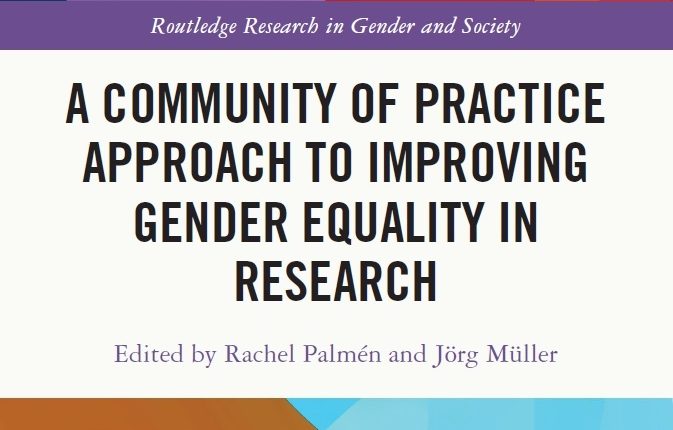The book A Community of Practice Approach to Improving Gender Equality in Research, edited by GenTIC researchers Rachel Palmén and Jörg Müller, has been published by Routledge. The publication reflects on the use of Communities of Practice (CoPs) to further gender equality in research and innovation (R&I) organisations and higher education (HE) institutes throughout Europe, based on the practical experiences and lessons learned in setting up and supporting eight CoPs as part of the H2020 project ACT (2018–2021).
Read the full book in open access on the Routledge platform.
The publication includes 12 chapters that document the lessons learnt by CoP members, CoP facilitators and collaborators. In the introduction and concluding remarks, Jörg Müller and Rachel Palmén outline the evidence on gender equality in research, innovation and higher education, and expound on the conceptual issues and implications of the book contents in relation to the wider literature on communities of practice and gender equality.
In Chapter 2, Aleksandra Thomson, Sarah Barnard, Tarek M. Hassan and Andrew Dainty provide a theoretical contribution which argues for developing a new concept: a Community of Political Practice (CoPP). The design process of the Gender Equality Audit and Monitoring (GEAM) tool developed by the ACT project is examined by Kevin Guyan, Amanda Aldercotte, Jörg Müller, Maria Caprile and Sergi Yanes in Chapter 3. Additionally, Aleksandra Thomson, Kathrin Rabsch, Sarah Barnard, Tarek M. Hassan and Andrew Dainty present in Chapter 4 a selection of co-creation methods utilised in the ACT project and reflect on how such methods enable Communities of Practice to act as change agents towards institutional change.
First-hand CoP experiences are brought together in several chapters that report on the ACT Communities of Practice’s activities to facilitate the necessary conditions for effective gender equality interventions in research and academia. The ACT CoPs are thematically organised and involve a heterogeneous range of disciplines, geographical locations, and cultural contexts. The book includes reflections on six of the CoPs created and supported throughout the project written by authors who acted as CoP facilitators. GEinCEE, the CoP that addresses structural change in research and academia in Central and Eastern Europe, is examined by Paulina Sekula, Ewelina Ciaputa, Marta Warat, Ewa Krzaklewska, Sarah Beranek and Sybille Reidl in Chapter 5. Jovana Mihajlović Trbovc describes in Chapter 6 the CoP for Alternative Infrastructure for Gender Equality in Academic Institutions (Alt+G), which brings together researchers from Slovenia. In Chapter 7 Sonja Reiland and Lisa Kamlade share their experiences as facilitators of two CoPs with specific disciplinary focuses, one on life sciences (LifeSciCoP) and the other on physics (GENERA). A case study based on the GenBUDGET CoP is analysed by Laufey Axelsdóttir, Finnborg Steinþórsdóttir and Þorgerður J. Einarsdóttir in Chapter 8, which explores the potential for an international CoP to foster interorganisational cooperation and create knowledge about gender budgeting. To end this section, Areti Damala, Chloé Mour and Anne-Sophie Godfroy present the underlying motivations and steps to set up the Strategies for Sustainable Gender Equality CoP (STRATEGIES), which focuses on the concept of “sustainability”.
The final chapters of the book reflect on the added value of CoPs for implementing gender equality strategies to advance institutional transformation and the extent to which the CoP approach has impacted on the three gender equality objectives in the European Research Area: gender equality in scientific careers, gender balance in decision-making and integrating the gender dimension into research and innovation content.
Related links

